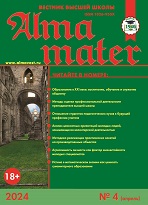UDC 314/316
https://doi.org/10.20339/AM.01-23.040
Alena S. Nikitina, Cand. Sc. (Sociology), Docent, dean of the Faculty of State and Municipal Administrationat at Ural Institute of Management — branch of Russian Presidential Academy of National Economy and Public Administration (RANEPA), e-mail: Nikitina-as@ranepa.ru
Currently, digitalization and digital transformation are actively penetrating into various spheres of public life, new and new forms of their mass application are emerging, and citizens’ access to information technologies is expanding. For a legal and democratic state, the issue of openness of government is paramount, therefore, a special role in the process of digital transformation should be given to the creation of channels of information openness of the activities of state power. To study the problems of implementation and prospects for the introduction of information systems for monitoring and controlling the activities of authorities in modern Russia in 2021–2022, an empirical sociological study was conducted using questionnaire survey and expert interview methods. The method of data collection is a questionnaire survey of citizens of the Russian Federation aged 18–60 years (n = 2256 people) living in Russia. Heads of state and executive authorities, heads of commercial organizations, representatives of the academic community in the number of 25 people were invited as experts. As a result of the research on the way to the implementation of the concept of an open state, the main problems identified today are the following: unwillingness of authorities to be subject to control, closeness of information about the activities of authorities, high corruption, lack of interest among citizens, underdevelopment of civil society, bureaucracy of authorities, low level of education and upbringing of the population, lack of an understandable digital platform, imperfection of legislation, “digitalization for the sake of digitalization”, low security of personal data, low level of Internet ownership of technologies, lack of interest among citizens.
In order to effectively solve the above-mentioned problems, we believe that it is necessary to further develop civil society institutions, increase government transparency, conduct systematic activities to improve the quality of work of civil servants responsible for citizens’ appeals, train digital transformation managers and, of course, apply digital solutions to increase transparency and efficiency of government activities with regular quality assessment and rating These decisions are analyzed by both the state and citizens to improve the level of information openness.
Keywords: digital transformation, digital information openness, population, citizens, open state, transparency of government, digital social control.
References
1. “The State Duma supported the project on the use of ‘Public Services’ to appeal to the authorities” URL: https://ria.ru/20221027/gosuslugi-1827191003.html (accessed on: 28.10.2022).
2. “Incident management» helps the authorities to respond better to the needs of the population”. URL: https://fedpress.ru/expert-opinion/2402678 (accessed on: 28.10.2022).
3. “Digital economy of the Russian Federation”. URL: https://digital.gov.ru/ru/activity/directions/858/#:~:text=В%20состав%20Национальной%20программы%20"Цифровая,Федерации"%20входят%20следующие%20федеральные%20проекты% 3A (accessed on: 29.10.2022).
4. Zubarev, S.M., Ivanov, A.V. Socio-political risks of digitalization and their impact on public administration. Science. Culture. Society. 2021. No. 4.
5. Krel, M.V., Poteev, P.M. Promotion of culture. In: Client-centric approach in public administration: navigator of digital transformation. O.V. Linnik, A.V. Ozharovsky, M.S. Shklyaruk (eds.). Moscow: RANEPA, 2020. URL: https://cx.cdto.ranepa.ru/4-1-organizacionnaya-kultura-chto-ehto-takoe-i... (accessed on: 29.10.2022).
6. Decree of the Government of the Russian Federation dated 24.11.2009 No. 953 “On providing access to information on the activities of the Government of the Russian Federation and Federal executive authorities”.
7. Digital transformation strategy: Write to execute. E.G. Potapova, P.M. Poteeva, M.S. Shklyaruk (eds.). Moscow: RANEPA, 2021. 184 p.
8. Federal Law “On the Procedure for Considering Appeals of Citizens of the Russian Federation” dated 02.05.2006 No. 59-ФЗ.
9. Federal Law “On Ensuring Access to Information on the Activities of State Bodies and Local Self-Government Bodies” dated 09.02.2009 No. 8-FZ.
10. Federal Law “On General Principles of the Organization of Public Power in the Subjects of the Russian Federation” dated 21.12.2021 No. 414-ФЗ.
11. Federal Law “On the Organization of the provision of state and municipal services” dated 27.07.2010 No. 210-ФЗ.
Acknowledgments: the article was prepared with the financial support of the grant of the President of the Russian Federation for state support of young Russian scientists - candidates of science MK-5062.2021.2











.png)






